Back in 2008, shortly after the release of The Dark Knight, I wrote The Philosophy of Batman: Schopenhauer Edition, where I framed Batman and the Joker through the bat-literary tradition and in the Christopher Nolan movies as exemplars of “the Will” and “representation” — concepts drawn from the work of German philosopher Arthur Schopenhauer.
In this model, a universal urge to live, thrive and procreate — the “Will” — drives Batman and the Joker. It is vast, unknowable, and present in their physical bodies, like a man inside a Batsuit (or, as the story so often flips it, the bat within Bruce Wayne). Batman and The Joker can’t know the Will, but through the principle of sufficient reason, they can snap off shards of it that are explicable — these become representations. Through representations, people come to regard and understand themselves in relation to the Will.
In Schopenhauer, The Will causes suffering, and it causes people to want to procreate. People who want to procreate, but can’t, find proxy activities or find solace in art and contemplating forms. So Batman and the Joker, struggling with all these imperatives, determine their representations and impress them upon Gotham (itself a place full of Will that is suffering) as such:
- Batman inspires imitators, impresses the idea of Batman onto the populace as an inspiration and governing form, recasts the darkness of Gotham in his own image, as if it is his cape or mask, and impresses his own fear, rooted in the death of his parents, onto criminals.
- The Joker impresses absurdity on social order, makes the world seem senseless and comedic, leaves around icons of clowns and jokers, makes people wear clown masks, impresses upon society games for his own amusement, and, famously, but not in Nolan, sprays gas on people that turns them into laughing death masks in his own image.
The two struggle against each other while recognizing their similarity. “You’re like me!” and all that. It’s very poetic.
(WARNING: From here on out, there will be The Dark Knight Rises spoilers)
Of course, The Dark Knight was a long time ago, and The Dark Knight Rises is the new hotness. I did not expect my connection to hold up, but there was one part of The Dark Knight Rises in particular that made me think of Schopenhauer and revisit the relationship between the Will, Batman, Bruce Wayne and the world in which they all exist.
And Still I Rise
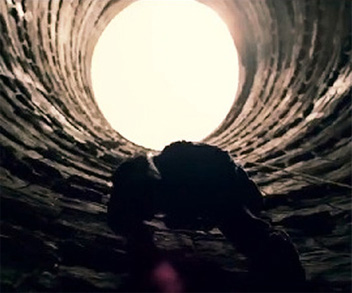
And then a very long Batman movie became a very short Lassie movie.
While The Dark Knight is mostly about representations, The Dark Knight Rises is much more about the “will-to-life.” In the central scene, Bruce Wayne, locked in Bane’s cistern-like prison, has one chance to escape — a Ninja Warrior-esque ascent up the Middle East’s most treacherous climbing wall.
Bruce trains and trains, making use of only the finest bat-calisthenics and rope-and-punch-based alternative medicine. But even once he shaped up, Bruce can’t quite make it past a giant leap in the climbing wall. He leaps, he misses, he plunges, and, dejected, he dangles by the safety rope around his waist until lowered to confinement. Strength itself, it seems, is not enough — nor is the altruistic impulse to save your city from annihilation.
We discover from the guy who gives Bruce Wayne the answers that he must take the safety rope from around his waist — the fear of death, he say, is a necessary motivator for Bruce to realize his full potential. Self-preservation is the most primal and powerful of drives, we learn, and depriving ourselves of it in the moments where we must be at our best is a dangerous handicap.
(Actual huge spoilers, you’ve been warned)
This lesson — to be at your best, you must motivate yourself with self-preservation — is repeated in the final act of the movie.
When Batman confronts defeats Bane, takes the bomb out to sea, and fakes his own death, his big reward, more than saving Gotham, more than beating the League of Shadows, is to live, so that he emigrate to Europe and have sex with Anne Hathaway, but mostly so he can be not dead.
From the beginning of the movie, it’s clear that Bruce Wayne needs to find a way out of his situation, but there are only two ways out of being Batman, quitting and dying. Given the choice, in the third movie in an epic trilogy, we would expect bat-death. But Bruce, like George Michael before him, chooses life, and Gotham is lucky he did, since it’s the only way he finds the strength to save them.
Bruce Wayne’s “rising” is not a Springsteenean “The Rising,” where society comes together to heal in the face of horror, nor the rising of a saint or Christ figure who undergoes apotheosis and departs for Heaven through death — it’s more similar to the “climb outta Hell” from Al Pacino’s great inspirational speech in Any Given Sunday:
Pacino speaks of a tension between the death of “getting the shit kicked out of us” and the death of “being willing to die to get that inch” — he’s not ambivalent between these outcomes. He would rather not die. But in order to fight for life, and avoid death, he must face the fear of death, and it needs to matter to him.
This is similar to what Bruce Wayne does when he “rises” out of the prison and what Batman does at the end of the movie when he “rises,” through victory and saving himself. He gets out of his head that he’s ambivalent toward dying, he decides not to die — in his own interest — and he then faces the fear of death and uses it as a motivator to accomplish great things.
A Condo in the Lazarus Pit
There has been a lot of talk about Occupy movement imagery in The Dark Knight Rises, and cases made that the movie is politically conservative. But the true philosophical conflict of the movie is not between haves and have-nots, but between two potential origins for moral action and judgement.
- A separate, vaunted, Kantian “thing-in-itself,” distant from immediate experience, acting through phenomenological intermediaries in pursuit of abstractly defined goals
- A more Schopenhauer/Nietzsche/Heidegger (wow, that’s a big net) oriented individual present in and interested in the things that are happening — who feels pleasure and pain and has wants and needs in the here and now
It is a struggle between, on one hand, the authority of symbols and abstract ideas, and on the other, the authority of beings.
As I mentioned in The Philosophy of Batman: Schopenhauer Edition, Ra’s Al Ghul’s (the antagonist of Batman Begins, who appears in the year’s most unnecessary ghost cameo hallucination) approach to leading the League of Shadows is similar to German philosopher Immanuel Kant’s idea of the thing-in-itself — the world as it actually is cannot be observed; only the phenomenological world, the world we can see and understand, is visible.
The Rational Will, the thing that confers value by making judgements, dwells with the thing-in-itself, not with the phenomenological world. Ra’s sets himself up as the thing-in-itself producing the Rational Will — the secret, unknowable originator who manages a world of phenomena, conferring value on it and making judgements as he sees fit, in service to what he sees as natural laws, universal laws and the dignity of humanity.
In a Kantian way of looking at things, ideas of art, duty and morality share a quality of elevation and separation from the people who undertake them. Art is most successful and beautiful when it is disinterested in satisfying base needs. Acts made in the interest of gratifying the senses or causing pleasure for the agent have a lot of trouble being morally good, because these sensory responses are phenomenological, not part of the thing-in-itself.
These should be familiar moral ideas. You hear them when people complain about music being bad because it is commercial or popular, or people’s good deeds not being praiseworthy because they profited off them. They have value, but in The Dark Knight Rises, they are the Villain.
The intention that turns out to matter is not Bane’s phenomenological revolution, but the intention of the thing-in-itself –Talia’s intention, the true master of the League of Shadows. Talia is nostalgic, but disinterested in Bane’s pleasure or pain (literally suppressing his senses with the tube mask, mostly so he remains useful) and invisible to those looking at the phenomenological world.
And of course we learn that her intentions aren’t elevated after all.
- Talia isn’t a tongue of flame bearing the spirit of righteousness, she just really liked Batman Begins and wanted to do it over again, except with an extra large popcorn and a fresh pack of Batman revenge-killing.
- Bane is the obvious example. What Bane wants doesn’t matter at all (in fact, his chief value to the League is that he wants nothing for himself). He makes speeches about political and economic equality, but we all know he is lying — he just intends to kill everyone anyway and uses the words cynically to rile everyone up.
- The scarecrow’s court is a mockery of justice, the literal elevation-on-a-bunch-o-tables a mockery of judges’ efforts to ritualize their impartiality through pomp.
In this movie, aspiring to a greater purpose separate from yourself and elevated above yourself through logic, institutions and abstractions depends on a lie — the lie that the originator of the Rational Will is disinterested — that there are effective, admirable people who can rise above their self-interest and rule and judge objectively.
The Sickness Unto Bat
Bruce Wayne tells this same lie throughout the first act of the movie. He tries to separate from Batman and from Wayne Enterprises, even from his own body — to become like Ra’s Al Ghul with all his doubles — invisible, disinterested, and transcendent — directing events from the shadows. But of course it doesn’t work. Dis-involving himself from the phenomenological world instead makes him sick, weak and depressed.
He can’t even keep track of his charity donations. We learn, tellingly, that Bruce’s charity donations to the facilities for orphan boys depend upon the profit of Wayne Enterprises — that by disinvolving himself from his self interest, Bruce Wayne has not become more moral — he’s become less moral, because he’s become just less.
So, being Kantian really isn’t working for Batman.
Schopenhauer’s Happy Suggestion
Of course, Schopenhauer, that intolerable mope, might suggest that in this situation Bruce Wayne should just kill himself. Clearly the miseries of his life are outweighing its pleasures, and since Schopenhauer is pessimistic about the human condition in the extreme, there isn’t much harm in dying now rather than dying later.
Thankfully, the point of these articles is not to show how closely these stories hew to philosophical tradition, but to use philosophical tradition’s vocabulary to understand them and articulate an enriched sense of what is happening and what to get out of the flicks.
In this framework, I see the Batman story as a reconciliation of the epic with the pessimistic — where the human condition is grim, but the yearning for heroes is so great that the very things that make people miserable (trauma, loss and the will-to-life) turn out to create its greatest triumph and hope, much like the much-referenced-on-this-website Book XXIV of the Iliad, where the universality of death allows for a moment of mutual understanding and pity between Achilles and Priam. The very impulses that make Bruce Wayne torture himself as Batman create either the hero it deserves or the hero it needs right now, whichever one is the yes in that line near the end of the movie that I always get wrong.
So, in The Dark Knight, Batman has this will-to-life, this desire to survive and procreate, and it causes him a lot of suffering. It also makes him put on the mask that reflects a representation of the will and look to reproduce the image of it — of himself — all over Gotham. This is not the best situation imaginable — it still kind of sucks to be Batman, and Gotham is still pretty crappy — but it is a better situation.
And it gets that way not because Batman is selfless, but because he is self-obsessed. His energy to reproduce drives him toward extraordinary things, which we have to imagine he enjoys at least someone, or at least which follow earnestly from his yearnings.
At the beginning of The Dark Knight Rises, eight years after the events of The Dark Knight, it’s clear that this will-to-life has been too painful to confront, and he has tried to get away from it — with the result that he’s moved on from the representation of Batman. He’s not feeling that same yearning, and, as such, he’s not producing that same epic, self-involved public service that everybody likes so much.
If you consider the Will as one big unknowable thing and the various representations as shards of the Will, Bruce Wayne has traded in his shard. He now sees himself in terms of a different representation of the Will, but this representation is not nearly on such mutually beneficial terms with the will-to-life. He’s still tortured, but this time it’s by inadequacy, failure, and self-debasement, rather than the Batman’s self-involved hunger for justice.
He has tried to manage the Batman legacy remotely, looking to others — in particular to the legacy of Harvey Dent — to fill in the gap — but he’s failed.
In other words, Bruce Wayne isn’t courting the death of “being willing to die.” He’s courting the death of “getting the shit kicked out of him.”
What a Batman Wants
So, to stop getting the shit kicked out of him, Batman needs to stop acting like a Kantian and start acting like the later German philosophers descending from Schopenhauer who invest a great deal of moral authority in individual beings authentically going about the business of getting whatever it is they want. To our ears, this sounds dangerously selfish, even amoral — and certainly much of this philosophy repudiates closely held Judeo-Christian moral values. But it is not quite so foreign to us.
He needs to learn to value his own life and his own opportunity to live it, or he will not make good things happen. He needs to be true to himself. He needs to do what he loves, so he doesn’t work a day in his life. (You know, other than the whole inheriting billions of dollars and not having to do that anyway.)
Once Bruce figures out that he really does want to move on, compelled to a life past Batman (where he actually reproduces, ‘natch), he is renewed. He is once again positioning himself in alignment with the will-to-life, or the will-to-power, or the authentic experience of being in the world — pick your poison. He once again becomes an inspiration for Gotham — with Commissioner Gordon lighting the flaming bat-signal on the forehead of the Brooklyn Bridge. He needs to get through the current ordeal to live that life, of course, but the fresh motivation proves to be enough to not only get the bomb out to sea, but to eject to safety. He even inspires an imitator to follow in his footsteps — an imitator who appears to be having a lot of fun.
The 99 Purr-cent
Catwoman is the assurance in the movie this sort of individualism is not a Randian quality of the independently wealthy — that rebels, organizers, protesters, and rogues — so long as it is a characteristic of their representation of the will as authentically experienced — also thrive when they align the things they enjoy, the things they need to do to survive and the things they think are right. Catwoman is a clear parallel to Batman in that she is also after a “life after this” and finds extraordinary motivation in the suffering that this will-to-life brings upon her. She doesn’t hang around waiting to get the shit kicked out of her — she puts that safe six inches in front of her face, and those pearls six inches below it.
Her place in the final shot where we see her is a bit problematic, though. She is either as transitioning into the bourgeoisie and abandoning her principles or as finally inducing the upper crust to share the wealth with her. Although it’s actually unclear whether Bruce Wayne has any money in the life he leads after the movie. But it sort of looks like he does.
Who knows these days — it’s so hard to get a stable exchange rate on batarangs-to-euros. So perhaps we have to wait and see on that one.
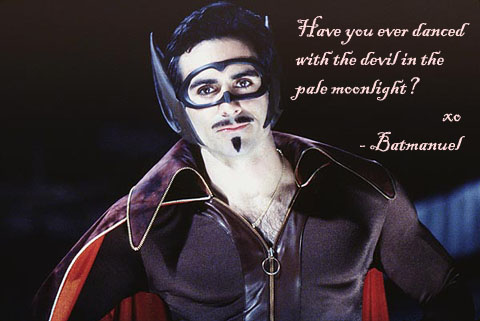
I know this is irrelevant, but dammit this is one of my favorites, and I’m using a paper-thin excuse of the end of the article to reuse it.
What do you see as the major philosophical levers at work in The Dark Knight Rises? What do you think sets apart Bruce Wayne and Catwoman from Talia, Bane and the League of Shadows? What does Alfred’s trip to Burma have to do with Karl Popper or John Stuart Mill? Sound off in the comments!
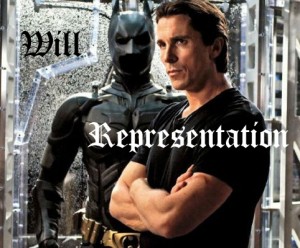
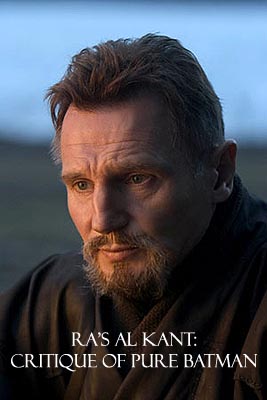
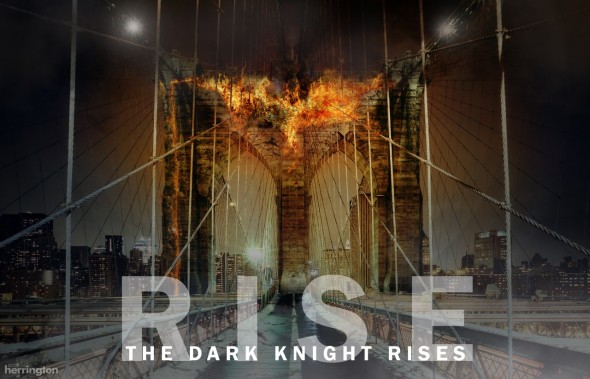
Bang-up job. I could drink this for breakfast.
Could the device be another example of the duality above (where you bullet-point Talia, Bane, and Crane)? It’s created and Talia (as Miranda) touts it as a way to “provide clean energy for an entire city” in order to start a green revolution that will save the world, when her true intent is for it to become a bomb that will start a civilian revolution and then, ultimately, destroy said city.
As for the questions at the end.
I think Nolan tries to show us the difference between Catwoman and Batman vs. Talia and Bane through a few scenes and small lines. Both deliberately care for others during their fulfillment of their will-to-live (or, to borrow your phrasing, poison of choice). Selina has her bff/roommate/fellow prostitute/whatever that she takes care of, and she saves that kid with the apple; she also shows remorse for taking the big mansion because it used to belong to a family, not just some faceless rich person(s). So her motivation is to get that Clean Slate and start over, sure, but on the way, she goes out of her way and helps others (or demonstrates displeasure in the pain of others). And Batman has his whole track record, basically, but specifically in this movie, when he’s in the prison, he says he doesn’t want to die in there and watch his city destroyed. Now, the diction there is tricky- he calls it “my city” and all, indicating a possessiveness and selfishness. But his consistent desire to reduce collateral damage (in the human sense- property is a whole different issue…), to not use bullets, and, I think most importantly, to set up his successor in order to keep “his city” secure in his absence, indicate he’s at least tangentially interested in the well-being of others, ALL others- Catwoman is slightly different in that she doesn’t care about people that would stand in her way (hence her quibble about bullets).
On the other side, we have Talia and Bane. They both don’t care what happens to others, ally, neutral party, or whatever. Bane kills more than one of his goons himself, and Talia gives the order to her Tumbler driver to “shoot them, shoot them all,” indicating she doesn’t care if it’s a goon, a cop, or a civilian getting shot. Talia shows herself so wrapped up in her own goals that she leaves behind Bane- not to die, but to suffer through her own death. I think that’s the big tell. “His only crime was that he loved me.” And she runs off to protect the bomb until it goes off. The pain in Bane’s eyes doesn’t sway her into staying or altering her plan.* All Bane cared about, meanwhile, was her, and once he knows she’s lost to him, he takes his pain out on Batman and, in a purely emotive response, actually goes against Talia’s wishes and gets ready to kill Batman.**
So the good guys are imperfect forms of that will-to-whatever, while the bad guys are perfect ones. In the end, that imperfection is why the good guys survive- the bad guys are so blinded by their goals that they fail to see the bigger picture and how that affects them.
As for JS Mill (be ready, I wrote a thesis on utilitarianism and stoicism)… We have two different interpretations of utlilitarianism going on, here, a more classical, Millean perspective focused on overall happiness in society (utility is a social, not an individual, thing), versus a more modern, self-oriented interpretation called “preference” utliitarianism, a theory more along the lines of oldschool rational choice theory, saying a person will pick the outcome/take the action/ etc. that would lead to the most happiness for their own individual desires (preferences) (utility is a personal, not a societal, thing). From the above rant I gave, our good guys are classical, the bad guys are modern.***
BUT, you asked about Alfred, and also Karl Popper, whose brand of utilitarianism sort of flips the concept around and changes it to minimizing suffering instead of increasing happiness. And I’m wracking my brain here… But… The best I can come up with is that Alfred was going to his little cafe in order to see if Bruce’s pain had been minimized. He knew all that Gotham was for the young man was pain and suffering- so in order to avoid (or minimize) that, he wanted Bruce to stay away.
*We could say there’s a parallel between this scene and the one with Alfred. But the moment in the jail gives Bruce the chance to get beyond that self-absorption, whereas Talia never has a moment of revelation like that.
**Tom Hardy is exceptional during that whole scene, from the moment Batman knocks him into the building to the moment Catwoman shoots him.
***Which in itself could lead to interesting commentary on old versus new, and we could call the movie a restatement of Renaissance Era mentality and idolization of the ancients.
Also also also- the imperfection. I forgot to say this could be taken as commentary on humanity itself, saying that what makes people good is the fact that they are NOT perfect. The characters throughout the whole trilogy that are, indeed, flawed, that look beyond to see the bigger picture, are the ones that make the “most right” decisions and choices. Even Rachel choosing to marry Dent is an example.
Yeah, one of the big themes of all three Batman movies is that the only “people” who are perfect are constructed identities used as symbols, whether they are semi-fictional personae, like Ra’s Al Ghul’s public face, or memorializations, like Harvey Dent in TDKR.
Perfection is a quality of abstractions, not of beings. Everyone has their secret or not-so-secret shames. So to aspire to perfection, you have to aspire to abstraction.
If you want to actually live your life and act on the world from within it, you necessarily reject perfection as a goal – and then the conflict comes from when people demand perfection of you politically and socially.
I wouldn’t necessarily agree that the jail helps Bruce get over his self-absorption. I might recast that as Bruce getting over his self-abstraction.
After the jail, Bruce is actuall more keenly focused on his own wants and needs than before the jail — but he has considerably relaxed the degree to which he has mythologized his identity to himself.
In retrospect, the exchange, “But Bruce, you’ve given them everything!” “Not everything; not yet” is actually pretty funny — and probably why Bale delivers it not with solemnity, but with a bit of a smirk.
What we’re led to believe in that moment is Batman is saying “I haven’t given them my life, so I’m going to do that.”
But what Batman really means is “I haven’t given them my life, and I have no intention of doing that if I can help it.”
Hm, I kind of took the “not yet”-plus-smirk as, “But I’m planning something even you’ll be impressed by,” because of their pre-established dynamic. Although I suppose the two interpretations could actually compliment one another- “I don’t plan on giving my life, but wait until you see what I’ve come up with, baby!” Or something to that end.
The key parallel that leaps out at me from DKR is that we assume Bane is Batman’s shadow (even their costumed faces are mirrors of one another) – but it’s a red herring. Bane is Alfred’s shadow, the protector and nurturer; Talia is Bruce’s reflection, driven mad by the deaths of her parents.
Alfred’s utilitarian standpoint drives him away from Bruce because it’s the only leverage he can use – he doesn’t want Bruce to die. He fundamentally disagrees with Bruce over his hermit-like existence and over Batman as a concept – for Alfred, life and happiness trump the pursuit of obsession. Bane, in contrast, won’t abandon Talia because he is absolute in his loyalty. He’ll happily see her die – or kill millions, including himself – if she wishes it. He’ll even act without her approval to sustain her ends, such as when he attacks Batman after her departure from the bank. For Bane, will trumps all. But it’s not his own will – is he a Nietzschean?
“Bane is Alfred’s shadow”
This is brilliant, and goes a long way toward explaining the part of the movie I really didn’t understand — which was why so much of the first act of the movie focused on Alfred.
This is worth keeping in mind during a second viewing.
I wouldn’t call Bane a Nietzschean, because he happily subordinates his own power under the power of someone else — someone who may very well be weaker than he is. The little girl prompting Bane to fight everyone in the pits to cover her escape is totally the lamb using social structures to ensnare and subjugate the bird of prey.
I’d stand by the notion that Bane is closer to Kantian — that he applies rational moral choices not in his own interests, but in the interest of his devotion to Talia.
When Bane says to Batman “I am the League of Shadows!” we think (on first watch) that he is the secret leader of the league, or (on second watch) that he is covering for Talia — and maybe he is a bit. But he also means that he has evelated his duty to the league above his personal inclinations or even his existence as a being into a moral imperative.
And that, as is the case in most superhero literature, storytelling devices gift powers to people that correspond to their moral imperatives.
What is really intriguing is the fraternizing Talia does with Bruce Wayne (sleeping with him) before she kills him.
It’s funny because pre-Talia-reveal (which even as comic book reader I failed to see coming) I couldn’t see how their romance fit with the rest of the story, and seemed a bit shoed into the plot. Afterwards, it adds enormously to a picture of Talia as calculating, predatory and a bit loony.
I think it’s very interesting that the film never winks at us once regarding Talia before her reveal. Femme fatales rarely come with a cover as credible and well-rounded as the one Talia employs. When she sleeps with Bruce and helps him with the company, it seems she has a legitimate professional and business interest, and an understandable personal attraction. It’s very nifty stuff.